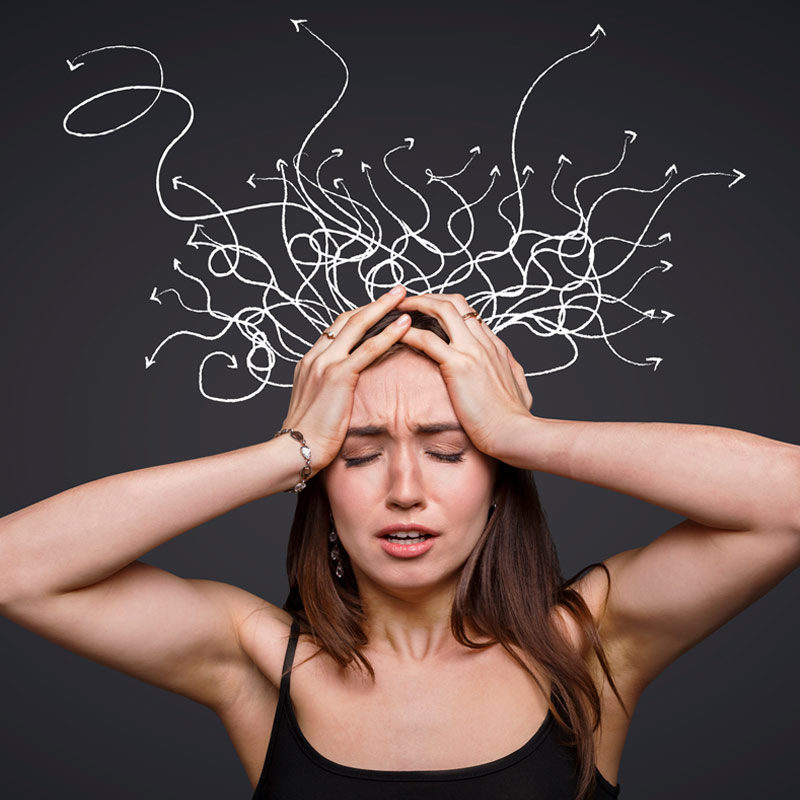Most of us have experienced the pain and frustration of laying in bed for hours unable to fall asleep. Sleep is a paramount pillar of our physical and mental health. And poor sleep can wreak havoc on your body and your mind.
Why do we need sleep? Well, let's let the experts at the Sleep Foundation answer that:
With a good night's sleep, your body's immune system will be more defensive against those pesky intruders that make you sick. You'll be better at performing daily tasks and decision-making, and you'll be more alert and responsive to your surroundings, in turn keeping you safe.
So if sleep is so detrimental to our well-being, why do we so often experience the inability to sleep, even when we feel tired? Nearly half of the adult population report having experienced bouts of insomnia - the sleep disorder in which you have trouble falling or staying asleep.
So, what are the reasons why you can't sleep?
6 Reasons Why You Can't Sleep At Night
There are a variety of factors in your daily life causing you trouble sleeping even when you're tired.

1. Stress & Anxiety - Your day-to-day stress and anxiety may be causing your inability to sleep, and your inability to sleep probably makes you stressed and anxious. It's a vicious cycle. When you shut down for the day and lay down to get some sleep, your mind has the room to wander that it didn't have during the daytime.

2. Irregular Sleep Habits - Taking frequent daytime naps, having inconsistent sleeping hours, staying up too late, or sleeping in can all have an impact on how well you sleep at night.

3. Sleep Partners - If you share your bed with a partner, kid, or pet, bedtime can feel like a fight - fighting for space, fighting for the covers, fighting for comfort and silence.

4. Sleep Environment - You grow accustomed to certain temperatures, darkness levels, white noise, mattress, and pillow when you build a consistent sleep habit. Any time these get altered, it can entirely throw off your brain's set expectations.

5. Lifestyle & Diet - When you eat before bed, you're putting your digestive system to work, meaning your brain has to keep that functioning while it's also trying to go into rest mode. Drinking alcohol or caffeine and even exercising too close to bedtime can also make it difficult to fall asleep. Even certain medications have been linked to insomnia.

6. Screen Time - Phones, TV, and tablets before going to bed can also be considered a negative habit because the light they emit interferes with the body's natural sleep-wake cycle. In addition, the motion and activity on devices can lengthen the time it takes for the brain to "shut down" and prepare to rest.
Sleep Deprivation: Symptoms & Side Effects

As previously mentioned, poor sleep can affect your physical and mental health. Adults should be getting an average of seven to nine hours of sleep every night. Not enough or insufficient sleep can be directly linked to your quality of life and even shorten it.
That's right, your inability to sleep can actually be putting you in danger. The disorientation and fogginess that come with exhaustion can lead to accidents, both big and small.
Poor sleep will also weaken your immune system, in addition, you're at a higher risk of cardiovascular disease, Type 2 diabetes, hormonal imbalances, and high blood pressure.
It should be no surprise to anyone who has experienced even just one night of not sleeping that it will drastically affect your mood, and can be directly linked to anxiety, depression, and bipolar disorder.
Tips for Falling & Staying Asleep
If you're tired of trying and failing with over-the-counter sleep remedies, try some of these lifestyle changes instead:
- Disconnect from devices at least one hour before going to bed
- Use blackout curtains and white noise machines to drown out sleep disruptors like light and sound
- Adjust your thermostat and be intentional with your bed setting for optimal comfort
- Limit alcohol and caffeine consumption late in the day
- Exercise earlier in the day, or at least give enough of a buffer before hitting the gym and hitting the hay
- Try relaxation practices like yoga or meditation to calm your mind and body
Looking for more long-lasting sleep? If snoring, sleep apnea, or chronic sinus issues are keeping you from getting the sleep you need...let us help. We have simple and proven sleep and sinus solutions that can help you breathe easily and sleep more soundly.


